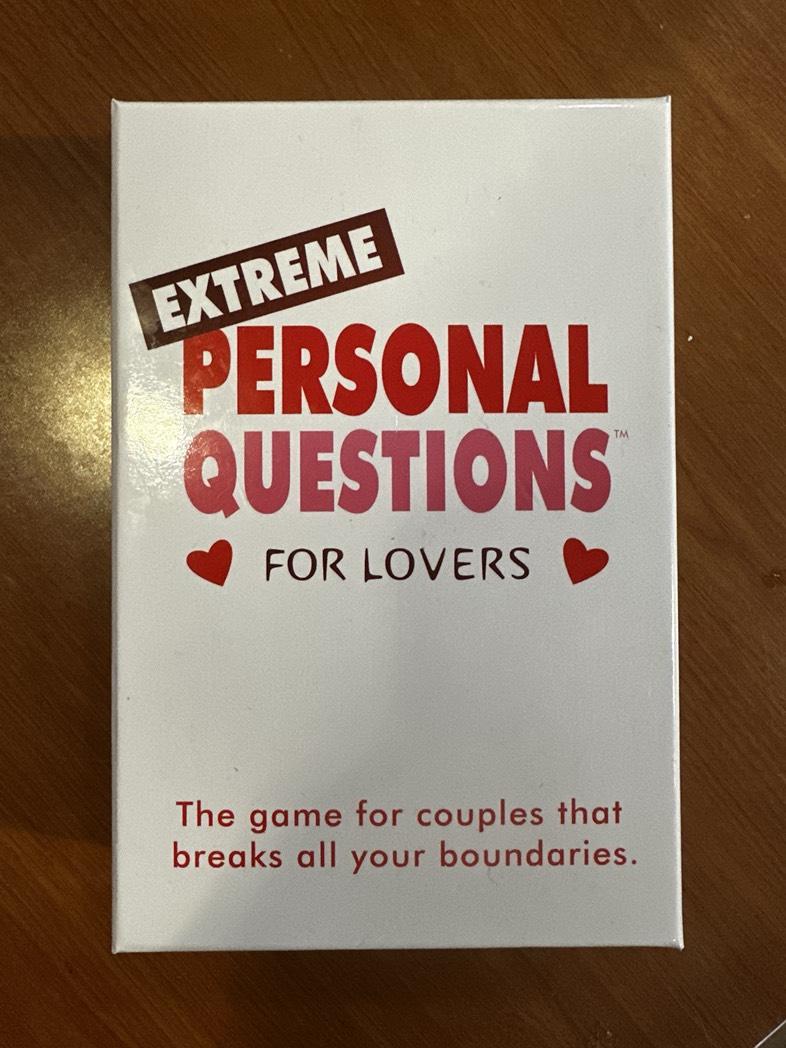For my Critical Play this week, I played the game “Extreme Personal Questions For Lovers,” which is based on the party game “Extreme Personal Questions” but targeted towards lovers specifically. The game was developed by Kheper Games, a company that offers a wide variety of adult games and novelties. The game is targeted towards adults (18+, lovers specifically) and is a card game. For my playtest, I played the game with my roommate because I do not currently have a lover.
“Extreme Personal Questions For Lovers” is a getting-to-know-you game, similar to “We’re Not Really Strangers” but targeted towards couples instead of strangers, and has a couple of different mechanics. “Extreme Personal Questions For Lovers” contains 200 cards with 2 questions on each card for a total of 400 questions. You and your lover take turns drawing cards, and asking the other player one of the two questions on the card. The other player can either answer honestly and collect the card, or pass and forfeit the card. The game has a win condition, where the first player to collect 20 cards wins and claims a reward decided by both lovers.

“Extreme Personal Questions For Lovers” is similar to our game, “In the Loop,” but also has some differences. Both games are getting-to-know-you games, but with different audiences. “Extreme Personal Questions For Lovers” is targeted towards couples and thus has more intimate/adult-themed questions. During my playtest this week, I had to pass on many sexual/adult-themed questions because I wasn’t able to play with someone where those questions would have been appropriate. “In the Loop” broadens the target audience by incorporating three different decks: Beginner, Medium, and Spicy, allowing for players to choose questions that are appropriate for the relationship dynamic of everyone playing. This allows for our game to be played by strangers, friends, and closest friends. This tiered mode also allows for replayability, where you can play the game on Spicy mode to develop deeper connections, or on Beginner mode for more unserious interactions, and maybe turned into a drinking game.
One more difference between the two games is the feature of a “wild card” in our game, “In the Loop.” Each deck has one wild card that can be drawn and used to ask any question of the player’s choice. This adds variation across playthroughs so the questions don’t get repetitive, and keeps players thinking about perfect questions to ask if they draw a wild card. For our game, this feature helps a lot since our prototype only consists of 10 questions for each mode, while “Extreme Personal Questions For Lovers” has 400 questions in total.
The two games are also different in that “Extreme Personal Questions For Lovers” has a clear win condition and a reward given to the winner, while “In the Loop” does not have any defined win condition, other than to foster fellowship and deepen connections, which can be seen as a win. However, whether a player gains a point/card in “Extreme Personal Questions For Lovers” is decided solely by the two players themselves, which allows flexibility in how the game can be played.
In conclusion, “Extreme Personal Questions For Lovers” is a getting-to-know-you game targeted towards couples and has appropriately themed questions, while “In the Loop” supports a wider range of players and introduces mechanics that provide replayability and can be used in many social situations.



